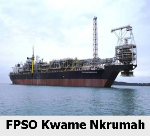Ghana Seeks Strategic Investors to Construct World Class Shipbuilding Facility
- Details
- Created on Friday, 04 April 2014 15:01
The government of Ghana has engaged the services of transactional advisors to guide and direct the state with respect to seeking a strategic investor to partner government in its bid to revamp and develop the Tema Shipyard into a world class shipbuilding facility.
Currently, the shipyard is in a deplorable state and needs modern equipment. It is characterized with huge financial losses, obsolete equipment and an aging work force. The shipyard, which was constructed by Ghana’s first President, Dr. Kwame Nkrumah, as a shipbuilding facility has yet to deliver on the objective for which it was set up.
And now with Ghana’s status as an oil producing country, it has become imperative for government to develop and provide a good dry dock to serve the country’s ever growing oil and gas industry.
In an exclusive interview with Orient Energy Review, the Deputy Minister of Transport, Hon. Mrs. Joyce Bawah-Mogtari, a maritime lawyer, indicated that to turn the fortunes of the shipyard around government needs to find a strategic investor with the requisite expertise and financial muscle to develop the shipyard.
To that end, The Ministry of Transport on behalf of government has engaged Messrs Kwame Asante and Associates and A. B and David Law as transactional advisors to guide and direct the state with respect to seeking a strategic investor to partner government.
The search for a strategic partner is currently underway in accordance with government’s Public and Private Partnership policy. “The shipyard requires a huge investment of cash to be able to revamp its operations. What has happened in the past is that when government puts money in a business, people do not run it as a profit making body. So government has decided that instead of investing its scarce resources, the policy now is to invite the private sector to participate as investors. This would ensure transparency and accountability. What the private sector participation does is to ensure transparency, profitability and accountability in the management of the company. So to a large extent, it would eliminate corruption and ensure viability and profitability of the business,” she explains.
She stressed that the purpose for which government requires a strategic investor is not just for the funds, even though that is a large part of it, but also an investor with the requisite shipbuilding expertise and track record required to run a shipyard.
Local Content
With the passage of the Local Content Regulations, the Deputy Transport Minister assured that government will implement the provisions of the regulations in its dealings with all investors and ensure that some aspects of the business and jobs are reserved for Ghanaians.
“The idea is to ensure that any investor who invests in our economy complies with the provisions of that regulation. It actually prescribes that at least 40% of any business, sub contract and jobs available must be given to Ghanaians,” she emphasized.
Presently, the shipyard employs well over 1500 workers. The Deputy Minister, made it clear that there was no challenge facing her in terms of staff strength, but what poses a challenge to her is the level of their training and the expertise they require to meet the current demands of the shipyard in the twentieth century, noting that,
“Shipbuilding has gone beyond the normal carpentry, welding and fixing of parts and would require more sophisticated skills to take the shipyard to the next level.”
She indicated that one of the first things a prospective investor should do is a skills needs assessment in terms of staff. “So the idea is not necessary augmenting the staff that already exists but to bring in the expertise that we do not have.”
Enforcement of MOU versus Government Policy
Late last year, members of the Tema District Council of the Maritime and Dock Workers’ Union embarked on a demonstration kicking against a purported takeover of the Tema Shipyard by Tullow Oil. The Union demanded government to hand over the operations of the Shipyard to the Ghana Ports and Harbours Authority in accordance with the Chris Akumey Committee Report.
However, the impasse was resolved with the signing of an MOU on August 30, 2013 between the Ministry of Transport, the Tema Shipyard, Tullow Ghana Limited, Tema Shipyard Local Union and the Maritime and Dock Workers’ Union.
On January 24, 2014, the ministry of transport had a meeting with managements of the Tema Shipyard, the union representative of the shipyard, as well as the maritime and dock workers’ union at the TUC. The meeting was to build consensus on the way forward for the shipyard and matters arising.
The ministry took advantage of the meeting to also introduce the transactional advisors to the management of the shipyard and the unions with the hope of agreeing on the broad guidelines within which the transactional advisors will be undertaking the process of engaging the prospective strategic investor.
Nonetheless, members of the Unions felt betrayed. They were not happy that a transactional advisor had been engaged before they were brought into the picture. The Union further advocated for the implementation of the terms of the MOU signed.
But the Deputy Minister insisted that the terms of the MOU signed and government’s policy direction are not in variance with each other.
“I think that even in that regard, what we have to bear in mind is that the company, Tullow Ghana Limited, was supposed to come in under the MOU in fulfillment of Ghana’s own local content regulations. The idea was for them to upgrade the shipyard and to use it for the fabrication of some components of the FPSO,” she explained.
By the terms of the MOU, Tullow Ghana Limited was expected to upgrade the shipyard, bring it up to a level where it will be able to provide the requisite services for the oil and gas industry.
Hon Mrs. Bawah-Mogtari stressed that while the terms of the MOU only provides for Tullow Ghana Limited to develop certain portions of the Shipyard to allow them build some components of the second FPSO and not for Tullow to take up the shipyard as a strategic investor to partner government, insisting that, “This therefore did not interfere with governments plans to engage a transaction advisor to find a suitable strategic investor for the shipyard.
We had anticipated that the signing of that MOU will enable Tullow to invest in the upgrade of the shipyard, such as training of staff, and refurbishing some of the derelict structures within the yard to bring the shipyard to a certain modicum of normalcy, this we anticipated would have given the shipyard a better bargaining power. In fact, that would have put us in better stead to negotiate for better terms from whoever has the money and expertise to invest in the shipyard.”
On the issue of the union being sidelined, the Deputy Minister pointed out that “Though normally the union would have wished to be part of the discussions from the onset, in this case, the Ministry of Transport was directed by government to seek private sector investment for the shipyard, reconstitute the board and appoint a new managing director for the company, all of which have been fully implemented”.
She however appealed to the union to bring up its concerns and recommendations to the Ministry, the Board and Management of the Tema Shipyard and also cooperate with fully with the transaction advisor so that together “we can re- brand the Tema Shipyard”.
source: reportingoilandgas






